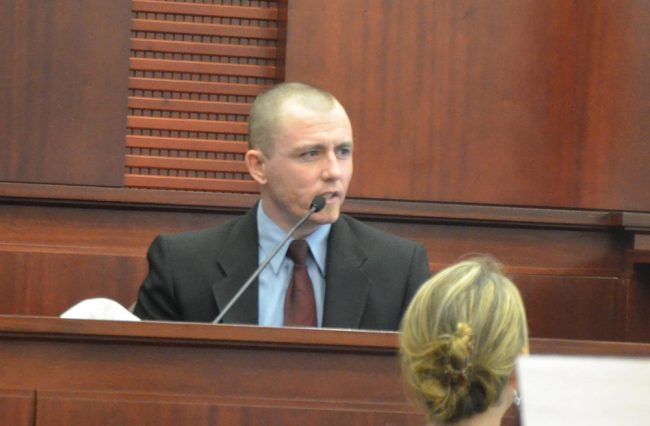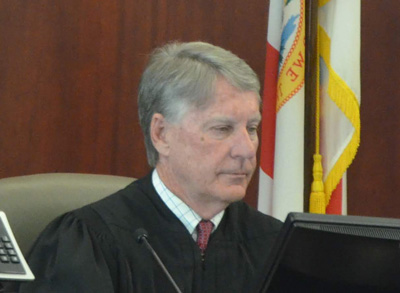
Bizarre, the word used today too many times to count by the judge, the victims and both attorneys at Michael Wilson’s sentencing, has been the controlling word in every step of the case going back to the sheriff’s characterization when Wilson was arrested on a charge of attempting to electrocute his wife at Christmas 2017.
“This is one of the most bizarre domestic violence cases I have seen in my career,” Sheriff Rick Staly said at the time.
It was not nearly as bizarre as Wilson’s trial, his acquittal on the most serious charge, his conviction on a relatively minor charge, and even his sentencing hearing and the judge’s sentence today: three years in prison and two years’ probation. But between the 573 days Wilson served in jail awaiting trial and sentence, and the allowance for early release after serving 85 percent of his sentence, he is likely to be out of prison in about nine to 10 months–by next June.
Wilson, 32, had himself been acting bizarrely the Christmas of 2017 when, under the influence of meth, he rigged his home’s entry door at 110 White Hall Drive in Palm Coast with a contraption that electrified the door handle. He claimed he was just paranoid and was protecting himself while he was spending a few hours in the house gathering a few belongings before returning to Tennessee–to be with his wife, the woman (pregnant at the time) the electrocution device was aimed at. The couple was talking divorce but still spending the holidays together.
Though the jury acquitted him of the attempted first-degree murder charge that could have exposed him to life in prison, it convicted him on an attempted battery charge. It’s a mere second-degree misdemeanor with a maximum jail time of six months. But the conviction nevertheless reflected the jury’s acknowledgment that Wilson had attempted to harm his wife–just not harm her much, a seemingly inexplicable rationale that allowed Wilson to avoid the harshest prison time.
The only reason he still faced prison is because while he was carrying out his strange design at the W-Section home, he found and stole a gun, and in another bizarre turn in the case, that charge stuck, though the gun was in his own home. The jury convicted him on a grand theft charge, a third-degree felony that carries a maximum prison penalty of five years.

Yet when Regina Nunnally questioned the victim’s mother after her testimony, the mother acknowledged visiting Wilson at the Flagler County jail repeatedly–and putting money in his account, and was doing so as recently as last March.
“I wanted to know why, why, why did you do this, did you do this, what happened, that’s why, that’s exactly why,” she told Nunnally. “I wanted to know his frame of mind.”
The victim, Wilson’s ex-wife, then testified no less emotionally. “By the time he gets out I want my family and I to be nowhere where he can find us,” she told the judge. “I just hope our words are taken into consideration.” She described at least two occasions when she says Wilson violated his no-contact order, one of which he was convicted for (a misdemeanor), the second a letter he sent, ostensibly to his daughter but, in the victim’s view, intended for her as a “veiled threat” that no matter what, he won;t let her separate him from his daughter.
“I’m not sure what the veiled threats are,” Nunally told the woman, who acknowledged that Wilson still has parental rights and would, like any parent, seek to see his child once his sentence is served. But to the victim, when Wilson wrote “there’s nothing that can keep me away from you” he meant there was nothing she, the victim, could do “that will keep him away from me.”
“He can take whatever legal recourse he needs to be able to see his daughter,” Nunnally said.
“Sure,” the victim said, “but that’s not what he said in that letter.”
Then it was Assistant State Prosecutor Melissa Clark’s turn at the bizarre. Clark outlined the disturbing history of the case, how Wilson “has demonstrated that he is absolutely a danger” to the family with which he was once associated, and to the community at large, how he continues to act with the same paranoia as he had before (intimations of his mental instability and possible schizophrenia were not allowed to be heard by the jury) and that he continues to flaunt court orders.

Nunnally asked the judge to sentence him to time served–meaning no additional jail or prison time, and no probation.
Finally came Circuit Judge Terence Perkins’s turn at the bizarre. While paying his respects to the jury verdict and stressing that he would never diminish its weight, nor hold it against Wilson to have turned down a plea offer of 10 years in prison and opted for trial, or “hold it against him for being acquitted at a jury trial,” nevertheless, the judge said, “that doesn’t mean I divorce myself from the testimony and the evidence in the case, that’s why I’m the sentencing judge.”
He then went on to provide an analysis of the case, based on the 14 pages of notes he’d taken along the way, that implicitly and sharply contradicted the jury’s more indulgent interpretations. The judge was laying out the rationale of why he would be handing out a prison sentence to a defendant who, based on his penalty scoring sheet, would normally avoid further incarceration altogether.

The judge summed up, calling it all “distressing,” before finding Wilson guilty of attempted battery and grand theft–and sentencing him to three years in prison with full credit for 19 months, and two years’ probation, when he is to have no contact with the victim and her family.
Wilson, who had looked–perhaps glared–the whole time at the two women who had testified, was relaxed, got fingerprinted and swabbed for DNA, as all convicted felons are, then spoke at length with Nunnally before being ushered out. The only reason he did not have a spring in his step–as he had after the verdict in June, when he was in civilian clothes–was because he was shackled.
.





























Wow says
He’ll be back. We’ll all say “why didn’t anyone stop him the last time?”
WILLIAM J NELSON says
Too bad we have Judges like this. H should serve the term for the VERY guilty Mr. Wilson.
Steve says
Lucky